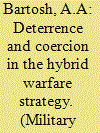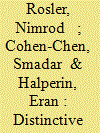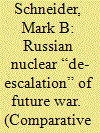| Srl | Item |
| 1 |
ID:
183999


|
|
|
|
|
| Summary/Abstract |
This paper conducts a comparative analysis of the role and significance of deterrence and coercion as elements of the hybrid warfare strategy against Russia. It proposes certain measures for countering such threats.
|
|
|
|
|
|
|
|
|
|
|
|
|
|
|
|
| 2 |
ID:
150993


|
|
|
|
|
| Summary/Abstract |
The goal of the current research was to examine how discrete positive intergroup emotional phenomena affect conflict-related attitudes in different contexts of intractable conflict. We hypothesized that empathy, but not hope would be negatively associated with aggressive attitudes during escalation, while hope, but not empathy would be associated with conciliatory attitudes during de-escalation. In study 1, we examined our hypotheses within a correlational design in an emotion-inducing context, while in study 2 a two-wave survey was conducted during real-life events within the context of the Israeli–Palestinian conflict; a peace summit as well as a war. Both studies supported our hypotheses, thus indicating the unique, yet complimentary, contribution of each of the two emotional phenomena to the advancement of peace.
|
|
|
|
|
|
|
|
|
|
|
|
|
|
|
|
| 3 |
ID:
164628


|
|
|
|
|
| Summary/Abstract |
Putin developed Russia’s nuclear strategy, which allows for the first use of nuclear weapons in conventional war, when he was secretary of the Russian National Security Council Staff. Russian nuclear doctrine allows for the first use of nuclear weapons in “regional or even a local” war. Starting in 1999, Russia began to simulate the first use of nuclear weapons in large, theater-war exercises. Since 2000, all large-scale Russian military exercises have reportedly featured simulations of limited Russian nuclear strikes. Russia characterizes the first use of nuclear weapons as “de-escalation” of aggression. There is an impressive body of evidence going back decades indicating that Soviet/Russia’s threshold of nuclear weapons first use is lower than what was publicly announced. Indeed, in 2014, General of the Army (ret.) Yuri Baluyevskiy, who managed the development of Russia’s nuclear doctrine, said that the “conditions for pre-emptive nuclear strikes…is contained in classified policy documents.” Since 2007, Russia has made numerous high-level overt nuclear threats, including, since 2014, nuclear threats relating to Ukraine and the Baltics. Putin is preparing for a major war with the U.S. and NATO. He clearly hopes the West will capitulate without one. If he miscalculates and a war results, the threat of nuclear strikes, and possibly the strikes themselves, will be a major part of his strategy for victory.
|
|
|
|
|
|
|
|
|
|
|
|
|
|
|
|